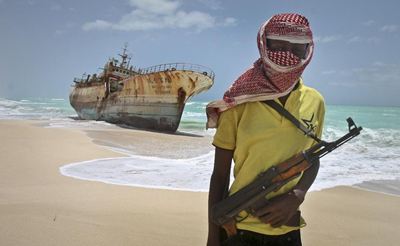
A special Piracy Ransom Task Force based in the United Kingdom recently recommended that the shipping industry cease paying ransoms to pirates after they hijack ships.
Since the piracy epidemic began in 2008, the task force estimates that over $300 million USD in ransoms has been paid to various groups of Somali pirates.
These recommendations were made despite a recent drop in piracy. An international effort since 2009 has finally resulted in a drop in the number of attack in the Indian Ocean. This is in large part due to international naval task forces and armed guards aboard shipping vessels.
British Prime Minister David Cameron recently shared his thoughts about the progress being made thanks to the international effort:
“The dramatic reduction in pirate activity in the past year shows how important collective action is, and the recommendations of the Task Force should make it harder for pirates to receive, and to profit from, ransom payments,” Cameron said in response to the task force’s findings and recommendations.
He continued, “But seafarers of all nations remain at risk, and we must continue to work to break the piracy business model, with the ultimate ambition of bringing an end to ransom payments.”
According to numbers from the European Naval Force (EUNAVRO), pirates hijacked 46 ships in 2009 and 47 ships in 2010. But numbers rose dramatically in 2011, when pirates attempted a record 176 hijackings. Fortunately, only 25 ships were successfully captured, indicating that new security measures were thwarting the pirates.
The number of successful hijackings decreased further in 2012, with only five having bee hijacked so far this year. The drop in ransom money has dealt serious blows to the pirate industry. This fact is worrisome to some, however, because pirates will likely adapt and get increasingly desperate in their attempts to extort more money out of passing merchant vessels.
At the moment, there are currently 140 crew members that are being held in captivity by Somali pirates. Recent efforts from Somali security forces on-land are making progress in cleaning out areas of pirates, and will hopefully result in the freeing of at least a proportion of those still in captivity.
The Puntland Maritime Police Force has recently begun an anti-pirate campaign, and has already clashed with several groups of pirates. The groups that they clashed with were associated with the MV Iceberg 1 – a ship that has been held captive for more than 2 years.
While efforts continue to clean out the criminals, the task force admitted that there is no clear and immediate way to cease paying ransoms to pirates. The only surefire way is to end the threat entirely, which involves close coordination, cooperation and information-sharing between all international bodies involved in the effort.